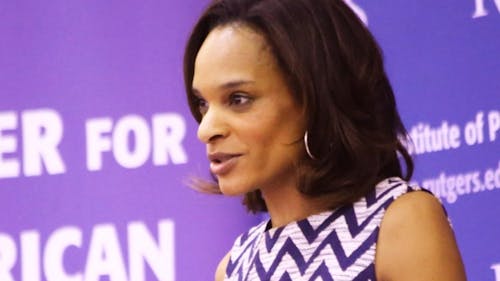CNN political reporter discusses race in 2016 elections at Rutgers

In a time when non-white voters are an increasingly large voting bloc, race matters, at least for the presidency.
The Center for American Women in Politics within the Eagleton Institute of Politics hosted a lecture by longtime political reporter Nia-Malika Henderson on Wednesday, who now serves as senior political reporter for CNN.
“The 2016 electorate will be the most diverse electorate we've ever seen in the history of elections,” the former Politico reporter said.
For some, the diversity would be a call for celebration, she said. For others, it would be a reason to panic.
“I think right now there are two very distinct parties. On the GOP side, it's very much dominated by older white voters. And the Democrats, we always hear about this Obama coalition, it's much more diverse,” the former Washington Post reporter said. “(President Barack) Obama was able to win in 2012 because he was able to win overwhelmingly that multi-racial coalition.”
Those same voters who voted at dramatically higher rates for Obama in the two previous presidential elections will be incredibly important this election, she said. In fact, those voters have already proven themselves to be a critical to a prospective candidate’s success.
Bernie Sanders’ (D-Vt.) campaign has already seen its share of trouble with non-white voters.
“To use his words, he says he 'got murdered' in the south because he couldn't attract black voters … in the south,” Henderson said. “Here's a man who's 74. He was born in Brooklyn, marched with Martin Luther King, but as part of … his leadership in Vermont, he didn't really have many black constituents -- I think Vermont is the second whitest state in the country.”
The problem has stuck with the Sanders, who lost the New York primary by 16 points to Democratic frontrunner former Sec. of State Hillary Clinton Tuesday.
Black voters just do not seem to like Sanders, at least they like him less than his competition— according to the Wall Street Journal, black voters in New York favored Clinton by a margin of 50 points.
That does not mean the former New York senator has not had her own share of problems when dealing with race, Henderson said.
“She's often been accused of pandering to black voters, pandering to Latino voters. I think when she panders to Latino voters it's called ‘hispandering,’” she said. “Her critics have always said she doesn't really deserve the black vote because of her support for this 1994 crime bill that her husband of course signed in to law.”
According to BCC, while it did not cause mass incarceration, the bill “may have amplified effects that were already under way.” It more than doubled the federal prison population, which now sits close to 215,000.
Because black people are incarcerated at higher rates than other groups according to data compiled by the Bureau of Justice Statistics, non-Hispanic black men account for 37 percent of the state and federal prison populations, the largest portion of any group, the bill may hurt Clinton.
The fact that Obama “seems to want” Clinton as his “heir apparent” likely proves a boon to Clinton’s campaign, Henderson said.
“(Tuesday) in New York, (Clinton) was quick to say part of her role as president would be to tackle systemic racism,” she said. “This is not a phrase that President Obama has used, it's not a goal that he has set and it's not going to be something that he has acknowledged in his presidency consistently.”
Some black progressives, she said, are disappointed with the president’s handling of race. They do not believe he tackled it as an issue often enough, letting it come to a head.
“I think one event you'll also see in Obama's closing days is that people feel that race relations have gotten worse … if you look back at ... January 2009, there was a poll that showed 79 percent of whites, 76 percent of blacks and 64 of Hispanics felt like race relations were (good),” she said.
Those numbers have fallen precipitously. Now, 33 percent of whites, 26 percent of blacks and 38 percent of Hispanics feel the same way, she said.
“One of the things that a Harvard researcher found is that, at this time, there are some whites who actually believe that anti-white violence is stronger and more powerful and a bigger problem than anti-black violence,” she said.
Nikita Biryukov is a School of Arts and Sciences junior majoring in journalism and media studies. He is an associate news editor for The Daily Targum. Follow him on Twitter @nikitabiryukov_ for more.



